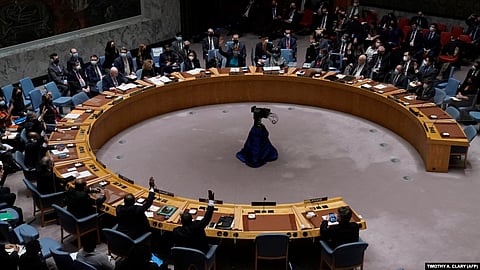
- NEWS
- the EDIT
- COMMENTARY
- BUSINESS
- LIFE
- SHOW
- ACTION
- GLOBAL GOALS
- SNAPS
- DYARYO TIRADA
- MORE

UNITED NATIONS, United States (AFP) — As world leaders gather for the annual General Assembly, the United States is calling for organizational reforms, being exasperated by Russia's veto power as it seeks to hold Moscow to account for its invasion of Ukraine.
In a recent speech, the US ambassador to the United Nations, Linda Thomas-Greenfield, voiced support for "sensible and credible proposals" to expand membership in the 15-nation Security Council.
"We should not defend an unsustainable and outdated status quo. Instead, we must demonstrate flexibility and willingness to compromise in the name of greater credibility and legitimacy," she said, without laying out specifics.
She said that the veto-wielding Permanent Five — Britain, China, France, Russia and the US — had a special responsibility to uphold standards and promised the US would exercise its veto only in "rare, extraordinary situations."
"Any permanent member that exercises the veto to defend its own acts of aggression loses moral authority and should be held accountable," she said.
Thomas-Greenfield acknowledged that the US has not always lived up to its standards but noted that Washington has used its veto only four times since 2009 — all but once to support Israel — compared with 26 times by Russia.
Russia and China scoff at such talk by the US, which under George W. Bush brushed aside the Security Council to invade Iraq.
Foreign Minister Naledi Pandor of South Africa, which has long sought African representation on the Security Council, said it was hypocritical to criticize the veto system just because of Russia.
"Some of us who have been calling for the General Assembly to have a greater say never enjoyed support, but suddenly, today?" she said at the Council on Foreign Relations in Washington.
Richard Gowan, an expert on the UN at the International Crisis Group, said there was genuine US concern over "dysfunction" at the Security Council.
"But also it's a clever way of putting China and Russia on the spot. Because we all know that the countries that are most allergic to the idea of council reform are Russia and China," he said.
The Permanent Five reflect power dynamics at the end of World War II, a historical moment crucial to Russian identity. Ukraine has recently made the novel argument that the Security Council seat belonged to the former Soviet Union and not Russia.
The biggest push for Security Council reform came on the 60th anniversary of the war's end as Brazil, Germany, India and Japan launched a joint bid for permanent seats.
China bitterly opposed a seat for fellow East Asian power Japan, one of the biggest contributors to the UN after the US.
Diplomacy watchers doubted any Security Council reform could happen so long as Russia and China see their interests at risk.
